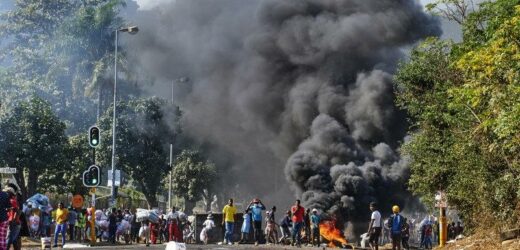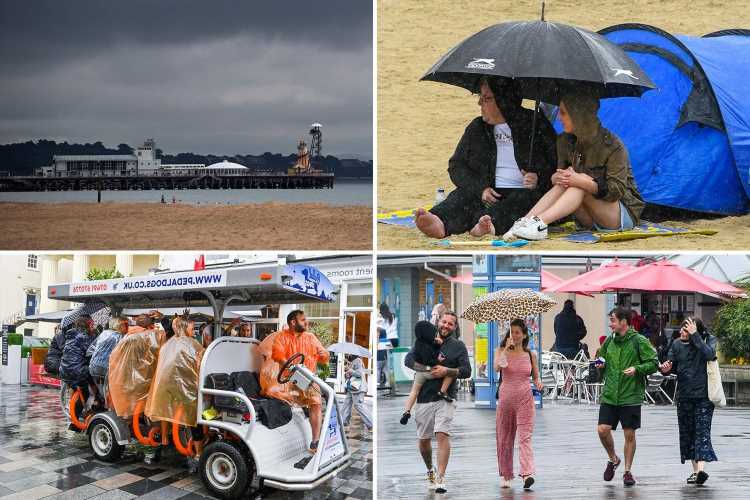Johannesburg: South Africa deployed soldiers to quell violence that erupted following the jailing of former President Jacob Zuma, after days of riots left at least six people dead.
Police said disturbances had intensified as Zuma challenged his 15-month prison term in the country’s top court.
The judgment in the case has been reserved.
Looters outside a shopping centre alongside a burning barricade in Durban, South Africa.Credit:AP
Smoke swirled from burning buildings as items from ransacked shops lay strewn by the side of the road in Pietermaritzburg in Zuma’s home province of KwaZulu-Natal.
The sporadic pro-Zuma protests that broke out when he handed himself over last week have escalated into looting and arson, mainly in KZN but also in Gauteng where the country’s biggest city, Johannesburg, is located.
Some COVID-19 vaccination sites and clinics in Gauteng and KZN were shuttered due to safety concerns, the Gauteng provincial government and an independent pharmacy association said, further delaying a sluggish immunisation campaign.
Looters carry items at Letsoho Shopping Centre in Katlehong, east of Johannesburg, South Africa.Credit:AP
“What we are witnessing now are opportunistic acts of criminality, with groups of people instigating chaos merely as a cover for looting and theft,” South African President Cyril Ramaphosa said in a late-evening address on Monday (Tuesday AEST).
He said 489 suspects in the two provinces had been arrested and all government agencies had been mobilised.
“We will not hesitate to arrest and prosecute those who perpetrate these actions and will ensure that they face the full might of our law.”
He warned that the looting of shopping centres, pharmacies and disruption to supply chains could lead to food and medicine shortages in the coming weeks, as well as disruption to the coronavirus vaccination drive.
A young girl carrying groceries looted from a nearby shop, walks back home at Naledi shopping complex in Vosloorus, east of Johannesburg.Credit:AP
A statement from the military said “pre-deployment processes had started” following a request for assistance from a government intelligence body, but a Reuters cameraman in Pietermaritzburg saw armed soldiers already in the streets.
Any confrontation with soldiers risks fuelling charges by Zuma and his supporters that they are victims of a politically motivated crackdown by his successor, Ramaphosa.
Zuma, 79, was sentenced late last month for defying a constitutional court order to give evidence at an inquiry investigating high-level corruption during his nine years in office until 2018.
The decision to jail him resulted from legal proceedings seen as a test of post-apartheid South Africa’s ability to enforce the rule of law, including against powerful politicians.
Former president Jacob Zuma addresses the press at his home in Nkandla, KwaZulu-Natal Natal Province.Credit:AP
In a virtual hearing on Monday, Zuma’s counsel asked the constitutional court to rescind his jail term, citing a rule that judgment can be reconsidered if made in the absence of the affected person or containing a patent error. But legal experts say Zuma’s chances of success are slim.
Footage shot by Reuters in the Katlehong township in Gauteng showed police firing rubber bullets at looters to disperse them.
At the Jabulani Mall in Soweto, looters walked past TV cameras carrying armfuls of stolen goods.
Liquor stores were among those affected, as the sale of alcohol is currently banned under COVID-19 restrictions designed to ease pressure on hospitals, as were shops of companies like pharmacy group Clicks Group, and food retailers Pick n Pay Stores and Shoprite Holdings.
As of Monday morning, the bodies of four people had been found – at least two with gunshot wounds – in Gauteng, intelligence structure NatJOINTS said. Two deaths had occurred in KZN, and all six were being investigated.
The governing African National Congress (ANC) said on Monday that the poor would bear the brunt of the destruction as critical public services had been disrupted and several small businesses destroyed.
Zuma’s imprisonment marks a significant fall from stature for a leading figure in the ANC.
He was once jailed by South Africa’s pre-1994 white-minority rulers for his efforts to make all citizens equal before the law. But for many, his reputation is now tarnished after a string of sleaze and graft scandals.
The corruption inquiry with which Zuma has refused to cooperate is examining allegations that he allowed three Indian-born businessmen, Atul, Ajay and Rajesh Gupta, to plunder state resources and peddle influence over government policy. He and the Gupta brothers, who fled the country after his ouster, deny wrongdoing.
Zuma also faces a corruption case relating to a $2 billion arms deal in 1999 when he was deputy president. He denies the charges in that case.
Reuters
Most Viewed in World
From our partners
Source: Read Full Article





